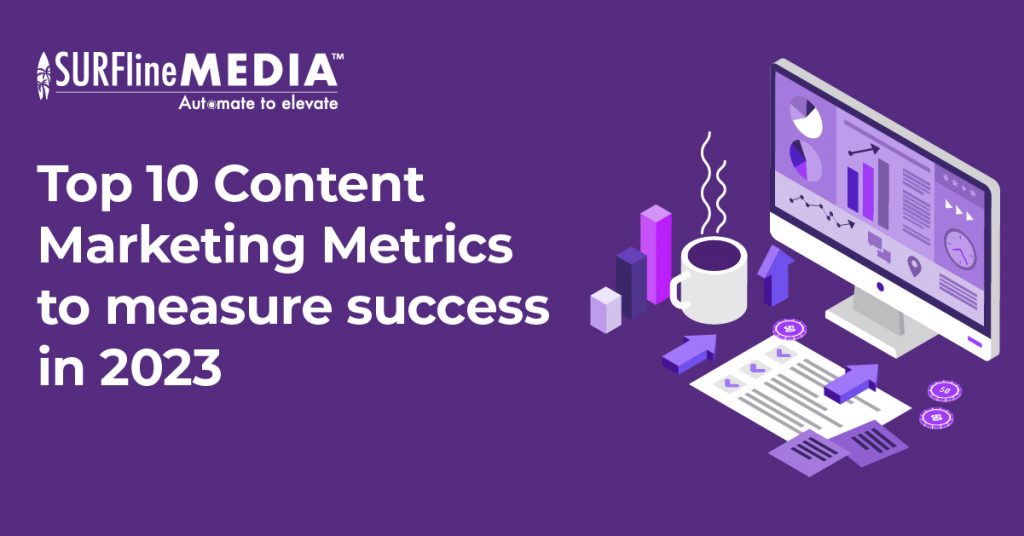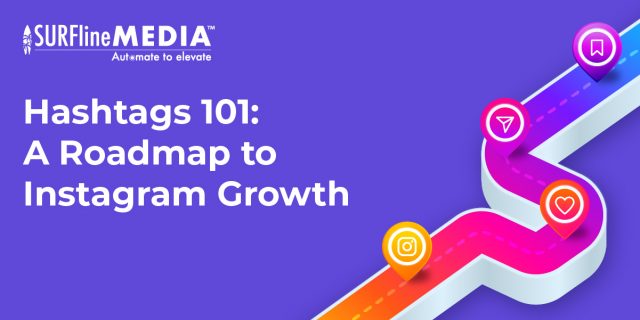

- August 17, 2023
- 4:00 pm
- No Comments
Top 10 Content Marketing Metrics to Measure Success in 2023
Content marketing has become a cornerstone for success, and measuring its impact is essential for optimizing and achieving tangible outcomes. Whether you’re a seasoned marketer or just starting on this journey, these metrics will empower you to make informed decisions. In this blog, we will guide you on the top 10 content marketing metrics that can transform your business’s online presence and drive remarkable results.
1. What are content marketing metrics and why are they important?
Content marketing metrics refer to the various quantitative and qualitative content marketing measurement used to assess the content performance and effectiveness of marketing efforts. These metrics help businesses understand how their content resonates with the audience, driving engagement, and contributing to overall business goals.

The importance of content marketing metrics has grown significantly over the years. In the early days of content marketing, success was often measured solely by the number of page views or likes. However, as the digital landscape evolved, marketers realized the need for more sophisticated metrics. These would bring them deeper insights into their content’s impact. Today, advanced analytics tools enable businesses to track user behavior, identify patterns, and optimize content strategies for better results.
Content marketing metrics are of paramount importance for several reasons. Firstly, they provide valuable feedback on the success of content campaigns, helping marketers fine-tune their strategies to enhance performance. Secondly, these metrics offer insights into audience preferences, allowing businesses to create more relevant and engaging content. Finally, content marketing metrics contribute to ROI calculations, enabling companies to assess the profitability of their marketing efforts.
2. Top 10 Content Marketing Metrics in 2023
2.1 Website Traffic
Website Traffic is one of the pivotal content marketing metrics, measuring the number of visitors engaging with a website. It gauges content effectiveness and overall marketing success. High traffic signifies successful campaigns and resonating content, while low traffic signals areas for improvement.
To recognize it, content marketers utilize analytics tools that track website visitors, sessions, and sources. If a blog receives a significant surge in visitors after being published, its content appeals to the right target audience and attracts organic traffic.
2.2 Social Media Engagement
Social media engagement is one of the content engagement metrics that measure the interaction and response on social media platforms such as Instagram, Facebook, Threads, or LinkedIn. It indicates how well content resonates with followers and the effectiveness of a brand’s communication efforts.
High engagement demonstrates a strong connection with the target audience, fostering brand loyalty and amplifying reach. Metrics like likes, comments, shares, and retweets quantify engagement levels. A post that receives a high number of comments and shares shows that the content is compelling, encouraging audience participation.
2.3 Qualified Lead
One of the most vital content marketing metrics that measures the number and quality of potential customers acquired through marketing efforts is Qualified Lead. It focuses on converting website visitors into prospects who express interest in a product or service.
Lead generation is crucial for business growth, as it nurtures prospects through the sales funnel. Recognizing lead generation involves tracking metrics like form submissions, newsletter sign-ups, or downloads of gated content (e.g., e-books, whitepapers). A company offering a free trial gains leads when users sign up for the trial by providing their contact information. Monitoring lead generation helps content marketers optimize strategies and improve lead conversion rates.
2.4 Conversion Rate
Conversion rate measures the percentage of website visitors who complete a desired action. The action can be making a purchase, signing up for a newsletter, or filling out a contact form. It gauges the effectiveness of a content strategy in turning visitors into customers or leads. To measure, marketers analyze the number of successful conversions divided by the total number of visitors, then multiplied by 100.
If a landing page receives 1,000 visitors, and 50 of them make a purchase, the conversion rate is 5%. Monitoring conversion rates helps content marketers optimize content and user experience to improve overall business growth.
2.5 Return Visitors
Return visitors track the number of people who revisit a website or online platform after their initial visit. It measures the loyalty and engagement of the audience with the content. High return visitor rates indicate that the content is valuable, relevant, and compelling enough to bring users back for more.
To recognize return visitors, marketers can use analytics tools to monitor unique visitor data over time. A blog with engaging and informative content sees a high percentage of return visitors who regularly check for new posts. This demonstrates the content’s effectiveness in building a loyal audience.
2.6 Audience Growth Rate
Among all content marketing metrics about reach, Audience growth rate measures the expansion of a brand’s reach and the increase in its follower base across various platforms. It gauges the effectiveness of content in attracting and retaining new audiences.
To recognize audience growth, marketers analyze the growth in the number of followers or subscribers over a specific period. For instance, a social media account gaining 1,000 new followers in a month demonstrates successful audience growth.
2.7 Keyword Ranking
Keyword ranking evaluates how well a website or content ranks on search engine results pages (SERPs) for specific keywords. It indicates the visibility of the content in search engines and its potential to attract organic traffic.
Marketers can use tools like Google Analytics or SEO software to recognize keyword rankings. A blog post targeting the keyword “best budget smartphones” succeeds when it ranks on the first page of search results. Tracking keyword rankings allows content marketers to optimize their content for better search engine visibility and attract a larger audience.
2.8 Organic Search Traffic
Organic search traffic measures the number of visitors who find content through search engines, without the influence of paid advertising. It reflects the content’s relevance and search engine optimization (SEO) success.
To recognize organic search traffic, marketers can use web analytics tools like Google Analytics, which tracks the source of visitors. If a blog post on “healthy recipes” receives a substantial number of visitors from Google searches related to healthy eating, it indicates effective SEO strategies and content that resonates with the target audience.
2.9 Cost per Acquisition
Cost per Acquisition (CPA) calculates the average cost incurred to acquire a new customer or lead through marketing efforts. It helps businesses assess the efficiency and profitability of their content marketing campaigns.
To recognize CPA, marketers divide the total marketing expenses by the number of new customers or leads acquired during a specific period. If you spend $1,000 on a content marketing campaign and gain 50 new customers, the CPA would be $20 per customer.
2.10 Return on Investment (ROI)
Return on Investment (ROI) evaluates the effectiveness of marketing efforts in generating revenue compared to the associated costs. It measures the profitability of a content marketing campaign.
To recognize ROI, you calculate the net profit from the campaign and divide it by the total cost. After that, you multiply by 100 to get a percentage. With $5,000 on a marketing campaign and $15,000 in revenue from new customers, you earn a 200% ROI.
Conclusion
Tracking and analyzing content marketing metrics is essential for the success of any content marketing strategy. By measuring traffic, engagement, leads, conversions, and other essential metrics, businesses can optimize their content efforts and drive meaningful results.
For businesses seeking expert guidance in content marketing, Surfline Media offers the best Content Marketing services. With a team of skilled professionals, we can help businesses create compelling content, optimize strategies, and achieve remarkable results. Contact us today!
_______________________

Surfline Media – Automate to Elevate
Our website: https://surflinemedia.com/
Contact us: https://surflinemedia.com/contact-us/
Phone number: +1 323-741-4482
Email: [email protected]






